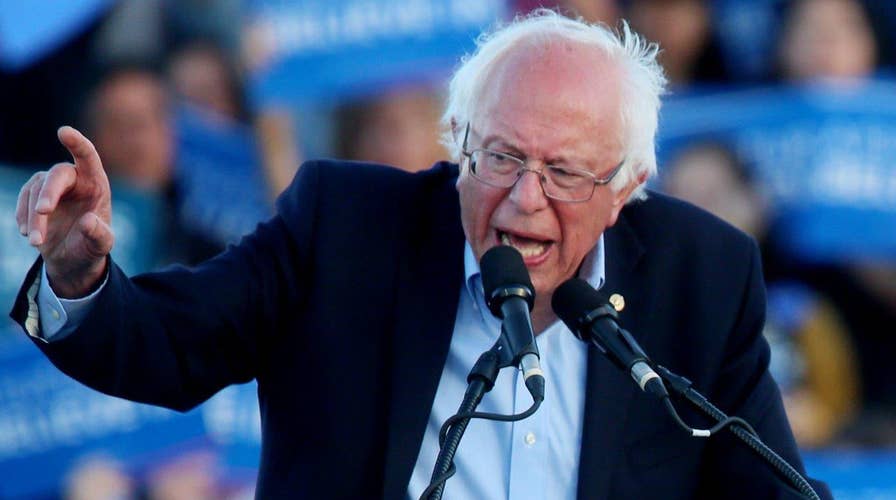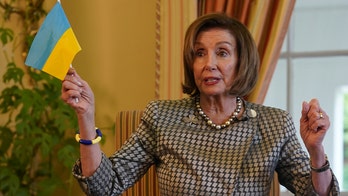What will Sanders do if Clinton clinches race in New Jersey?
Democratic presidential candidate has vowed to continue fight until convention
While Hillary Clinton moved to the brink of clinching the Democratic presidential nomination with weekend wins in Caribbean contests – and could pass the milestone with a victory Tuesday evening in New Jersey – polls show Bernie Sanders still could deliver a symbolic wound by taking the Democratic stronghold of California.
Several recent polls have shown the Vermont senator closing Clinton’s lead in California and bringing the race into toss-up territory. The latest, from CBS News, showed Clinton up just 2 points over Sanders, 49-47 percent.
The same poll gave Clinton a comfortable double-digit lead in New Jersey, which is voting Tuesday alongside California and four other states in the last major primary day of the year.
Thanks to strong victories for the Democratic front-runner over the weekend in the U.S. Virgin Islands and Puerto Rico, she is now in striking distance of the nomination -- 26 delegates short of the 2,383 needed to win, according to an Associated Press count. New Jersey could put her over the top Tuesday evening, before California even wraps up.
But an after-the-fact victory for Sanders in the Golden State would nevertheless be a blow to Clinton, who is trying to not only clinch the nomination but unify the party and nudge Sanders out of the race for good. A California win could energize Sanders and his supporters and encourage him to follow through on vows to take his fight all the way to the convention.
In a sign of what’s at stake, both candidates were barnstorming California ahead of Tuesday’s elections.
As the Puerto Rico race was called, Clinton was on stage in Sacramento, rallying voters in California.
Clinton captured at least 33 of the 60 delegates at stake in Puerto Rico. Sanders garnered at least 20, with seven outstanding. Clinton has 1,809 pledged delegates won in primaries and caucuses; Sanders has 1,520. When including superdelegates, her lead over Sanders is substantial -- 2,357 to 1,566.
The former New York senator and secretary of state is all but certain to secure the Democratic nomination Tuesday, when six states hold primaries in which a total of 694 delegates are available.
Like Clinton, Sanders made little mention of the outcome in Puerto Rico's primary. He said during an evening rally in San Diego that Democratic leaders should take notice that the "energy and grassroots activism" that will be crucial to the party in the fall "is with us, not Hillary Clinton."
He pointed to polls showing him faring better than Clinton in head-to-head matchups with Trump and his strength among Democratic voters under the age of 45.
"If the Democratic leadership wants a campaign that will not only retain the White House but regain the Senate and win governors' chairs all across this country, we are that campaign," he said.
While those watching the results in Puerto Rico focused on their impact on the race for the Democratic nomination, the focus of many voters on the island was its ongoing economic crisis.
Both Sanders and Clinton had pledged to help as the island's government tries to restructure $70 billion worth of public debt the governor has said is unpayable.
Two weeks before the primary, Sanders criticized a rescue deal negotiated by U.S. House leaders and the Obama administration as having colonial overtones. In a letter to fellow Senate Democrats, Sanders said the House bill to create a federal control board and allow some restructuring of the territory's $70 billion debt would make "a terrible situation even worse."
He later promised to introduce his own legislation to help the island. Campaigning on the island last month, Sanders promised to fight against "vulture funds" on Wall Street that he said would profit off the fiscal crisis.
"That bill is anti-democratic and it's not in the best interest of Puerto Rico," said Jorge Gaskins, a 67-year-old farmer who supports Sanders and opposes a control board.
Clinton has said she has serious concerns about the board's powers, but believes the legislation should move forward, or "too many Puerto Ricans will continue to suffer."
The Associated Press contributed to this report.





